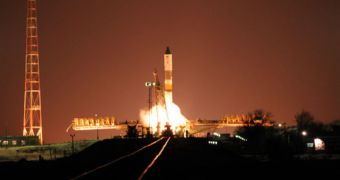An unmanned Russian spacecraft is currently chasing the International Space Station (ISS) through low-Earth orbit, prepared to dock on the facility today. The cargo capsule was launched from Central Asia a couple of days ago.
The Progress 41 cargo transport vehicle took off at 0132 GMT on Friday (8:32 pm EST on Thursday), from the Baikonur Cosmodrome in Kazakshtan. It is scheduled to arrive at the ISS on January 30, at around 0240 GMT (9:40 pm EST on January 29).
According to the official flight manifest, the cargo capsule carries around three tons of supplies for the six members of the Expedition 26 crew. This particular payload also contains gifts for NASA astronaut Scott J. Kelly, the commander of the ISS.
In addition, the Progress 41 delivers food, water, propellant for the station's maneuvering thrusters, scientific experiments and spare parts for various applications, alongside personal items for the crew.
The mission also takes a tiny satellite to LEO, which will be handled by astronauts as soon as they unload it from the capsule, say officials at the Russian Federal Space Agency (RosCosmos).
The spacecraft is a miniature Earth Artificial Satellite (EAS) called Kedr, which is housed in a cube about 22 inches (550 millimeters) on the side. It weighs no more than 30 kilograms (66 pounds).
It will play the role of orbital components for an amateur radio experiment carried out by NASA, the Radio Amateur Satellite Corp., and RSC Energia, the Russian aerospace giant.
Plans call for the tiny satellite to be set free into space during a February 16 spacewalk that astronauts will take outside the confines of the ISS. “It will transmit its signal at 145.95 MHz, with the amateur radio call sign is RS1S,” RosCosmos says in a statement.
Progress 41 will arrive at the ISS shortly after the docking of the Japanese-built H-II transfer Vehicle 2 (HTV2), which took place on January 27. It too delivered tons of fresh supplies for the ISS crew, Space reports.
The two cargo ships will be joined around mid-February by the second European Automated Transfer Vehicle (ATV), called Johannes Kepler, and by the space shuttle Discovery, around February 26.

 14 DAY TRIAL //
14 DAY TRIAL //